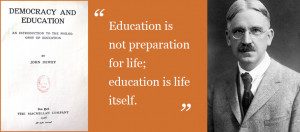
(Ed.) Dewey and Education in the 21st Century, Emerald Publishing Limited, Bingley, pp. (2018), "Dewey and the Democratic Curriculum", Heilbronn, R., Doddington, C. A tentative link between the democratic curriculum and increased student motivation and participation is made. The focus of attention will be on the English school curriculum (both primary and secondary), especially concerning the National Curriculum, and the debate over ‘standards’ and testing. These are as follows: a removal of the existing division between ‘academic’ and ‘vocational’ education pedagogy in the form of discussion and dialogue negotiation of curriculum aims and objectives with students and other local stakeholders. I argue that a democratic curriculum is one where a series of educational innovations or procedures are followed.

This chapter uses Dewey’s seminal Democracy and Education (1916) as a key text to investigate the concept of the democratic curriculum. Dewey's conception of education as laid out in Democracy and Education can be read as a serious challenge to this trend in that, while there are many kinds of community life that impact behaviour, including gangs and churches, Dewey argues strongly that there is still a vital need for common ground and that this is the business of education. John Dewey adopted a child-centered point of view to illuminate aspects of education he believed teacher-centered educators were neglecting, but he did so self-consciously and self-critically, because he also believed that ‘a new order of conceptions leading to new modes of practice’ was needed.


 0 kommentar(er)
0 kommentar(er)
